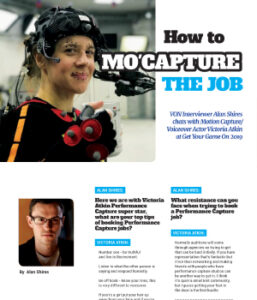 The Hustle of Performance Capture
The Hustle of Performance Capture
If you have read any of my other mocap or performance capture blogs, you will know by now I am passionate about this area of the industry. Accompanying that passion is the endeavour to ensure that I consistently continue sharpening my craft and learning as much as I can about this field. Any entrepreneur should be looking to become an expert in their field. I think if someone is doing something half-hearted, it really shows, and in entertainment, you do need to give it your everything to book the job otherwise, someone will get it over you. Moreover, if you are down in the dumps when performing, it’s going to set up a poor atmosphere for all involved, so the problem with that is, well… they just won’t book you again, and that is the worst problem you can have in this industry because word spreads fast.
Famous Actor Working in Performance Capture
I met Victoria Atkin at one of my client’s video game events called Get Your Game On, and I loved learning about her journey with Ubisoft, Assassins Creed, and performance capture. Victoria had booked one of the first lead female roles in a video game with her role as Victoria Atkin in the Assassins Creed syndicate. Many actors and voiceover artists work in mocap and performance capture aspire to book these types of roles. Typically, the pay is fantastic, the work is consistent for several months, and you get flown worldwide. It’s an amazing experience.
How Does a Voiceover Artist Book the Biggest of Jobs?
Victoria shared a phenomenal story of where she did a self-tape, sent it over, and then forgot about it. A year later, they booked her for it. Sometimes when we send self-tapes, it can take a while to hear back, so I think the best thing is just to forget about it and move on to the next job. In the meantime, you never know when the return on that audition or self-tape might present itself. We are so used to everything moving a million miles an hour, so it’s pleasantly unique to hear how this works with a massive title like Assassins Creed. The key is to always be ready, be ready to audition and self-tape, be ready to fly, be ready to be called in, and be ready for a call back.
Working with the Great Actors in Performance Capture
Victoria agreed to teach an intensive workshop for the organisation. I think it is essential to work with the people who have booked the jobs you aspire to book, so I signed up for this workshop. It was in 2019, in the early days of my ventures into mocap and performance capture. I am pleased to say I have built fantastic clients and booked excellent jobs since then. The workshop was very informative, and the content available was impressive. Learning from the best brings value because they have the experience of not only the process of booking the job but the knowledge of what it takes to see it through to completion. I used the workshop and the event as an opportunity to interview Victoria and get some powerful content for the readers.
Top Tips From the Best in Mocap
I wanted to know what challenges an actor and voiceover artist may face in mocap and performance capture. Well, the answer to this takes us back to that position we are very familiar with, that being, we are in a heavily over-saturated industry where a lot of the work is hidden behind a small number of agents. So, finding the work is a challenge. Mocap and performance capture is a small-knit community, so networking, building a portfolio, and attempting to be the best you can be is compulsory for success.
The Audition Process
We send in voice demos for a voiceover job and a showreel for the on-screen jobs, but what do we send off for performance capture and mocap roles? Any skills you may have, like parkour and arms usage, must be captured on camera. If you have the footage in the volume against what’s on the screen, then this is good to have (though keep it short), and finally, just deliver something that shows off your skills and unique abilities. What happens after the demo stage? Well, you may be asked to self-tape, and for mocap and performance capture, these range from being random to needing a lot of physical ability.
I have had auditions that required the tape to show a lot of movement in a vast space, I’ve had others that are looking to capture bigger characters with powerful facial expressions and line delivery. The final thing to consider with performance capture and mocap is the prospect of getting called into an audition. Though the world has changed how it deals with the audition process, it is not uncommon to be called in for an audition, even if you have sent demos and self-tapes. Sometimes you might be asked to audition instead of a self-tape, other times, it will be the third step following the demos and the self-tape. Over the years, I have learned to have fun in in-person auditions and try to give something to the casting director that they did not expect but is true to the piece. Don’t worry about what anyone thinks. Give your best performance, and just enjoy the experience. I love chatting with the team during an audition, after all, we are all human, and auditions are great networking and connection-building opportunities.